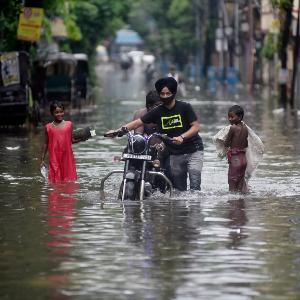Science communication: A new venture at LMU
29 Jun 2021
The Volkswagen Foundation will fund the Munich Science Communication Lab, which seeks new ways to convey information on health and climate change.
29 Jun 2021
The Volkswagen Foundation will fund the Munich Science Communication Lab, which seeks new ways to convey information on health and climate change.

Global warming will increase monsoon rainfalls, climate experts say. | © Indranil Aditya/NurPhoto/Picture Alliance
The contemporary world is characterized by an ever increasing degree of complexity. As the global challenges we face become ever more urgent and intricate, they are being further complicated by conflicts of interest and unexpected causal links between ostensibly distinct problems. Not only is scientific research expected to resolve these issues, scientists are now being called upon to communicate their findings and proposed solutions more effectively to the general public, and to offer reasoned guidance in dialog with society. Classical forms of the dissemination of information are no longer up to the task. This raises the question of how science communication can restore society’s trust in research, especially in cases in which the available evidence is not yet fully convincing. Given that the emotions and views propagated by digital media have a far more powerful effect on public perceptions of science than the empirical facts, how can better communication succeed in persuading the skeptics? What forms might a more appropriate and successful communications strategy take – while also embracing elements of audience participation, for example?
These are among the questions with which the new Munich Science Communication Lab (MSCL) will be concerned. The large-scale project will include include LMU experts based in the Institute of Communications Science (IfKW) and the Rachel Carson Center for Environment and Society (RCC), and specialists in the Faculties of Medicine, Biology, Geosciences and Physics, flanked by input from the Natural History Museum BIOTOPIA, the German Museum (das Deutsche Museum) and the Bavarian Media School as partner institutions. LMU Physics Professor Harald Lesch, well-known presenter of science programs such as Terra X, will also contribute his experience to the project. Thus, the venture encompasses research perspectives from the theory and practice of science communications, and from the ‘hard sciences’. The Volkswagen Foundation is providing 4 million euros for the project from its funding program "Science Communication3", initially for a period of five years.
The MSCL has chosen the topic "Planetary Health" as a test case for the design of novel communications strategies. This is an issue that is of immediate social relevance globally, as well as being highly complex and interdisciplinary from a scientific point of view. Moreover, climate change and the coronavirus pandemic have demonstrated how closely the degradation of natural habitats is bound up with human health. So the MSCL will consider not only global warming and global health, but also problems such as toxic waste and environmental pollution, food production, changes in land use and depletion of water resources.
"Munich is the ideal location for the establishment of a Science Communication Lab. As the leading research institution for communications science in Germany, we are coordinating the project. Researchers in a wide range of disciplines will take part in the venture, and well-known centers of science communication will provide experimental expertise and attract public attention," says Dr. Bernhard Goodwin, Project Coordinator at the IfKW. "The staff of the Laboratory includes researchers and practitioners in science communications as well as experts on planetary health. The MSCL will develop new models for science communication and subject them to practical tests. The results will provide a new impetus for academic debates on the subject, as well as creating new tools and resources that will be of use to researchers and professional practitioners around the world."
"In the new Lab, we will together develop innovative approaches to the communication of reliable information on vital questions such as the links between climate change and illness, and the connections between biodiversity loss and agricultural systems," says Professor Michael J. Gorman, Founding Director of BIOTOPIA, and Chair of the Life Sciences in Society at LMU. "The BIOTOPIA Lab at the Botanic Garden offers a perfect testbed for the exploration of new ways to inform the public about these issues," he adds.
"The new project will stimulate the ongoing creation of a Science Communication Lab at the Deutsches Museum," says Professor Helmuth Trischler, Director of the Museum’s Research Department and Co-Director of the RCC. "Likewise, the Museum’s Lab and new permanent galleries on topics like health and nutrition offer innumerable opportunities to try out new ideas, concepts and modes of participatory science communication. – Given our close cooperation with the Rachel Carson Center, the potential for synergies could hardly be greater."